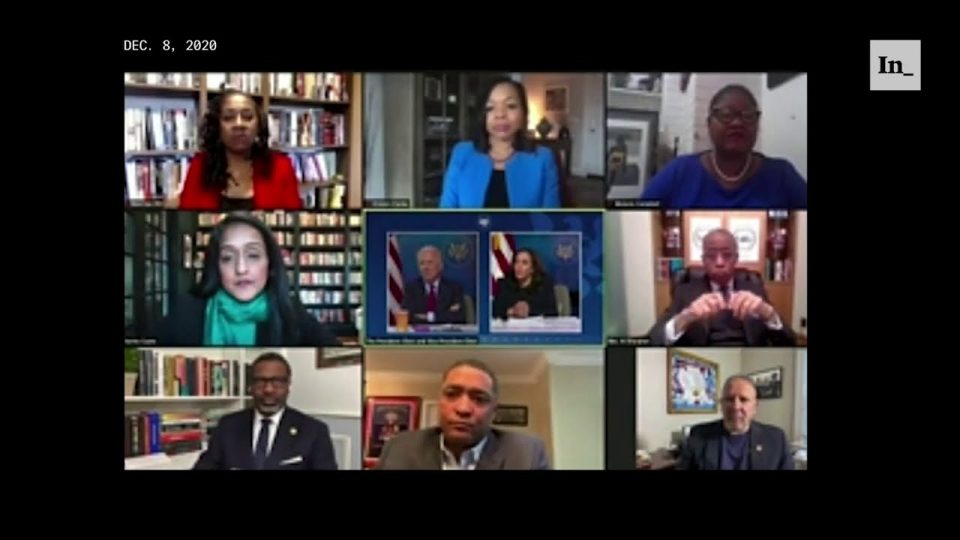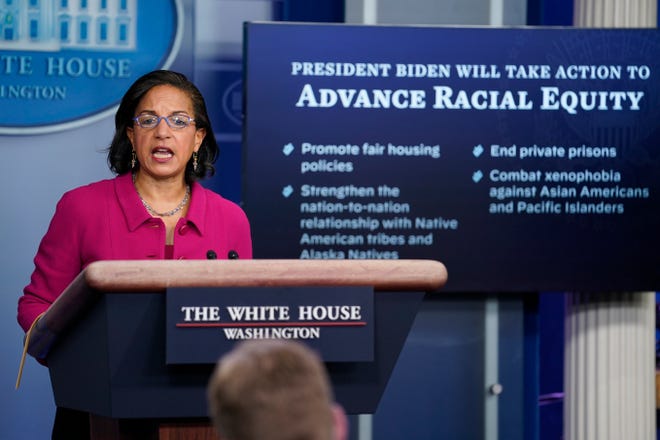Part 2
Biden’s Executive Order for Racial Equity is a Good Plan…But…
Will Congress Pass the Legislation to Make It A Reality?
by C.C. Campbell-Rock
On January 20, 2021, President Joe R. Biden Jr. signed his “Executive Order On Advancing Racial Equity and Support for Underserved Communities Through the Federal Government.”
“By advancing equity across the Federal Government, we can create opportunities for the improvement of communities that have been historically underserved, which benefits everyone. For example, an analysis shows that closing racial gaps in wages, housing credit, lending opportunities, and access to higher education would amount to an additional $5 trillion in gross domestic product in the American economy over the next 5 years,” the Order proclaimed.
Biden’s executive mandate orders every federal agency to review its program and policies. They must assess whether and to what extent its programs and policies perpetuate systemic barriers to opportunities and benefits for people of color and other underserved groups.
Federal Government has a role
“The Federal Government should… allocate resources to address the historic failure to invest sufficiently, justly, and equally in underserved communities, as well as individuals from those communities. To this end:

“Government programs are designed to serve all eligible individuals. And Government contracting and procurement opportunities should be available on an equal basis to all eligible providers of goods and services.”
Biden’s order gives agencies 200 days to provide a report to Susan Rice, the director of the Domestic Policy Council, and the director of the Office of Management and Budget (OMB). They must detail any barriers to full and equal participation in the procurement and contracting opportunities in their programs. Agencies also have one year to produce a plan with both directors. They have to produce a plan for addressing barriers and determine whether new policies, regulations, or guidance documents may be necessary to advance equity in agency actions and programs.
“These aren’t feel-good policies. The evidence is clear. Investing in equity is good for economic growth,” Susan Rice told reporters. “And it creates jobs for all Americans.” Rice said that the economy has lost $16 trillion over the last 20 years because of racial discrimination. Wealth is power.
Janet Yellen, Biden’s Treasury Secretary, plays an integral role in making economic equality a reality in America’s undeserved communities. The U.S. Treasury secretary is the primary economic advisor to the president. She is responsible for managing the federal government’s finances.
Related: READ PART ONE of the SERIES
“Yellen’s advice on finance, monetary, economic, trade, and tax policy would give her an opportunity to promote policies. For example, amendments to lending and housing finance rules that better recognize the challenges experienced by women, Black Americans, and other vulnerable US groups,” according to Quartz. Quartz is a news website, with an extremely diverse staff, that bills itself as “Global news and insights for a new generation of business leaders.”
Marc Morial, president of the National Urban League, said Biden’s initial steps and Rice’s role indicates racial justice will not be marginalized in the new administration. “It’s not time to pop a cork or spike the ball. No way. Don’t get me wrong but these are things that we have encouraged, asked for and demanded. So, it looks like we’re being heard at this stage,” Morial told USA Today.

Last December Derrick Johnson, President and CEO of the NAACP, met with Biden and Harris. He urged them to create a new cabinet position. National Advisor to the President on Racial Justice, Equity and Advancement.
“The structural inequality that is rooted deep within our society must be addressed, and after four years of regression on social, civil, and political matters that profoundly impact the American people, specifically, Black people, we must prioritize the transformation of our nation into a more just, equal society in which all Americans can succeed and thrive,” said Johnson.
WEALTH IS POWER: EXPANDING BLACK WEALTH
Although such a cabinet position has yet to materialize, it appears that Susan Rice will fill that role.
Go here to read Biden’s remarks about his Executive Order: https://www.whitehouse.gov/briefing-room/speeches-remarks/2021/01/26/remarks-by-president-biden-at-signing-of-an-executive-order-on-racial-equity/
Will Congress Pass Legislation to Stop Racial and Economic Inequalities?
“We clearly need new laws…We need the George Floyd Justice in Policing Act and the John Lewis Voter Protection Act, not just executive actions. Executive action is good but its only as good as long as that president is sitting in the seat,” Sharpton says, pointing to Trump’s executive actions that reversed President Barack Obama’s executive actions.
To see media coverage of Biden’s Executive Order on Racial Equity go here: https://www.facebook.com/realsharpton/videos/863156074257446
Forever in America, Black Americans have endured racial and economic inequities. The resulting jaundiced view of the Biden Administration’s ability to get much needed legislation passed is understandable. We must reduce the Black-White wealth gap. We must also level the economic playing field. Too many have never received their fair share of federal resources.
More than cynicism, such thoughts are based on past and current actions of elected officials. These officials often have done nothing to change the structural racism that perpetuates these injustices.
Kenneth Cooper, a Think 504 columnist, has a different take. He spoke about why racial and economic inequalities exist and may be intractable. Cooper spoke to listeners on WBOK Radio’s Early Show, during a Think 504 segment. Hosted by Oliver Thomas and the “Professor,” Cooper said that the problem lies with capital elitists in political office. He says, “They are only interested in acquiring wealth for themselves”
REAL GAPS EXIST
“In the second quarter of 2020, white households—who account for 60 percent of the U.S. population—held 84 percent ($94 trillion) of total household wealth in the U.S. Comparatively, Black households—who account for 13.4 percent of the U.S. population—held just 4 percent ($4.6 trillion) of total household wealth.”
Will Congress step up and pass legislation to address the pressing needs of people of color? Reverend Sharpton has some advice for Biden.
“He (Biden) should use his bully pulpit and his ability to deliver messages directly to the Democrats, who now control not only the white house but has a tied control of the Senate and the House.to get these laws through. And they must deal with the filibuster which was born in the cave times and was used to block civil rights and voting laws, we need to get rid of the filibuster and bring about laws that will protect the rights and fairness for the American people.”
Biden’s Executive Order on Racial Equity: https://www.whitehouse.gov/briefing-room/presidential-actions/2021/01/20/executive-order-advancing-racial-equity-and-support-for-underserved-communities-through-the-federal-government/
President-Elect Biden’s Zoom Call with Civil Rights Leaders: https://www.youtube.com/watch?v=a3G7n21p0kY
Next Week: WEALTH IS POWER: EXPANDING BLACK WEALTH – Part 3
What Do Black Economists Say About Expanding Black Wealth?

